FOCUS ON SABUKO
Testing interventions in Iori Plateau to conserve and protect local species PAGE 9


Testing interventions in Iori Plateau to conserve and protect local species PAGE 9

On May 28, despite months of civil protest, Georgian Dream’s Parliament overrode the President’s veto and adopted the law “On Transparency of Foreign Influence”. The law, presented by the Georgian Dream faction and vetoed by President Salome Zurabishvili, was supported by 84 votes.
The fact was met by a flood of messages of disappointment from Georgia’s international partners.
“With the ruling party using its majority in parliament to override the presidential veto of the ‘Russian law,’ the EU path of Georgia has for the time being come to an end,” said the Co-Chair of the European Council on Foreign Relations, Carl Bildt.
“The law on ‘foreign influence’ does not correspond to the values of the European Union. If the law comes into force, it will affect Georgia’s path to the European Union,” Josep Borrell, the
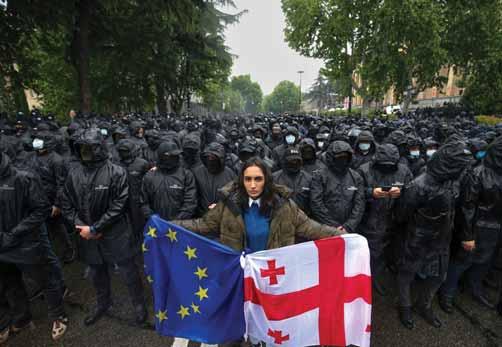
In this week’s issue...
YouTube Travel Channel ‘Yes Theory’ Prepares Film About Georgian Tourism
NEWS PAGE 2
Ukraine Latest: Macron Says Kyiv Should Be Allowed to Use Western Weapons on Russian Military Sites
POLITICS PAGE 3
Chinese Consortium to be Announced as Winner of Anaklia Port Project Tender
BUSINESS PAGE 6
Supporting Georgia’s Growing E-Commerce Sector
BUSINESS PAGE 6
Ibis Styles Opens its Doors in Batumi – A Sports-Themed Destination by the Black Sea
SOCIETY PAGE 7
Visiting a Tyrant - A Story of the Soviet Past Bursting into the Future
CULTURE PAGE 10
Interview with Curator Nino Asanidze of Ria Keburia Foundation
CULTURE PAGE 11
Continued from page 1
EU High Representative for Foreign Policy and Security Affairs, wrote on X.
“We will consider the EU’s response and make a decision at the Foreign Affairs Council in June. The October elections will be a test of Georgia’s commitment to its future in the European Union,” Borrell added.
“Dear Georgian friends, I have just one message to you: You are not only fighting for Georgia, you are fighting for Europe. You are fighting for freedom and democracy. WHEN THEY GO LOW, WE GO HIGH!” Chairman of the Foreign Affairs Committee of the German Parliament (Bundestag), Michael Roth, wrote on X.
The United Kingdom noted that it is “extremely concerned” about the veto of the bill on transparency of foreign influence.
“We still believe that the draft law is a backward step and will harm Georgia’s efforts on the way to integration with Euro-Atlantic institutions,” the British Embassy said in a statement.
“We are disappointed to see that the Parliament of Georgia overrode the veto of the President of Georgia on the antidemocratic “foreign agents” bill, although it was not unexpected,” White House Press Secretary Karine JeanPierre said.
“We saw tens of thousands of Georgians protesting this bill last week, one of the largest protests in Georgia’s history, and we know that many Georgians have made their opposition clear. This legislation requires civil society organizations to register as agents of a foreign government simply because they receive 20% of their funding from abroad. Civil society organizations play an important role in maintaining democracy, and creating this burden undermines their ability to do so. Suppressing civil society is what authoritarian governments do, and it is a weapon and tactic to suppress dissent. That’s not what democracies do, so we’re disappointed to see what happened,” Jean-Pierre added.
American Senator Jim Risch claimed
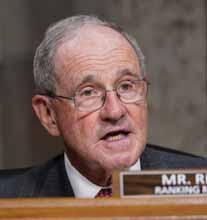
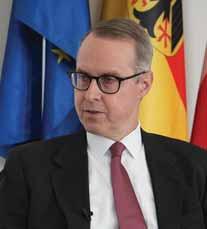
that, “With this move, the Georgian government has taken a firm step away from building a free and democratic society. While the US will continue to support the Georgian people, their government should no longer enjoy the support of the United States.”
“Disappointed but not surprised by Georgia Dream’s decision to override the President’s veto on the foreign agent’s law,” wrote US Senator Jeanne Shaheen. “My Georgian People’s Act would ensure accountability for those endangering democracy in Georgia and ignoring the overwhelming wishes of the Georgian people.”
Germany’s Ambassador to Georgia, Peter Fischer, noted that, “Georgia has passed a law that does not comply with EU standards, and as long as this law
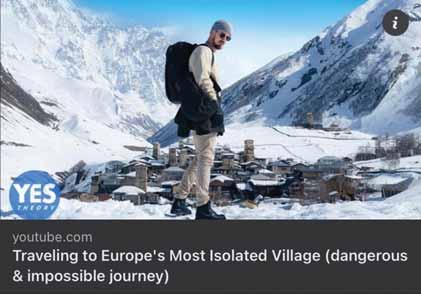
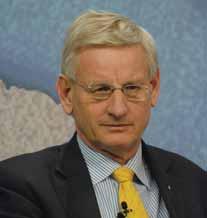
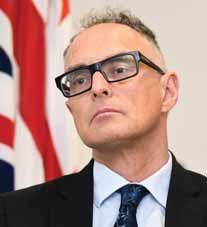
Tis functioning, we will not open accession negotiations. If you want to join the union, but at the same time criticize it as dangerous and call it a "global war party," then we should ask ourselves if we can communicate normally. Are we partners or not?"
“It is unfortunate that Georgia’s leaders are choosing to forgo the steps needed to advance Georgia in the Western direction that its people want,” Spokesperson for the Department of State, Matthew Miller, said Monday.
“Georgian parliament voted to override the Georgian president’s veto of an anti-democratic foreign influence bill that fails to conform to European norms, effectively turning the bill into law. The United States condemns this action. In passing this law, the ruling
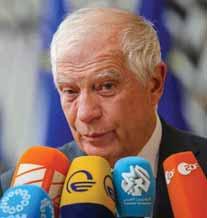
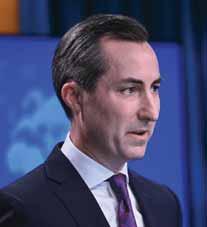
Georgian Dream Party moved the country further away from the European integration path and ignored the EuroAtlantic aspirations of the Georgian people who have taken to the streets for weeks to oppose this law,” Miller stated.
“Georgian Dream has disregarded the Council of Europe’s Venice Commission’s legal assessment, and that of Georgia’s closest partners, who made clear their concerns that the law would stigmatize civil society and media and limit fundamental freedoms. The ruling party’s actions and anti-Western rhetoric threaten Georgia’s democratic trajectory, future economic security, EU membership, and also put the US-Georgia relationship at risk,” he added.
Last week, Secretary Blinken

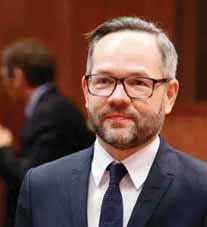
announced that anyone who undermines democratic processes or institutions in Georgia, as well as their immediate family members, may be found ineligible for US visas under a newly announced policy precluding travel to the United States. The United States has also launched a comprehensive review of the bilateral cooperation between the United States and Georgia.
“As Secretary Blinken said last week, we will take Georgia Dream’s actions into account as we decide our own,” Miller noted. “The United States continues to stand by the Georgian people as they work for a democratic and Western future. It is unfortunate that Georgia’s leaders are choosing to forgo the steps needed to advance Georgia in the Western direction that its people want.”
The Open Budget Survey 2023 stated that Georgia again ranks first among 125 countries in Budget Transparency. The Open Budget Survey also evaluates budget oversight and public participation, placing Georgia 5th out of 125 countries.
– Budget Transparency: 87 points (out of 100)
– Budget Oversight: 83 points (out of 100)
– Public Participation: 44 points (out of 100)
Yes
channel
he highly rated YouTube travel channel ‘Yes Theory’ has prepared a 36-minute film about Georgia’s mountainous tourist destinations. Famous YouTubers traveled to Svaneti and Tusheti and took part in an extreme tour, filming Ushguli, Omalo, Bochorna, and other places of tourist interest. The video shows the nature, culture, traditions and local dishes of both mountainous regions.
over 9
Compared to the 2021 survey, significant progress has been made in the area of Budget Oversight. The score has increased from 74 to 83 and in Budget Oversight, Georgia improved its ranking from 21st to 5th place. First launched in 2006, the Open Budget Survey is the world’s only independent, comparative, and fact-based research instrument to measure these essential aspects of governance and accountability: participation, oversight, and transparency:
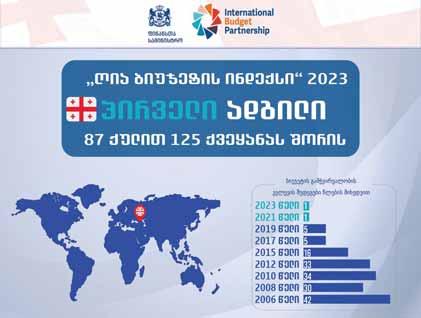
The main battlefield developments in the Russian invasion of Ukraine as of Thursday morning are as follows:
The death toll in a Russian attack on a hardware superstore in the eastern Ukrainian city of Kharkiv has risen to 11, says the regional governor, with President Volodymyr Zelensky condemning the attack as “vile”. Kharkiv region’s Governor Oleg Synegubov reported on Telegram that as many as 40 people were wounded and 16 missing after two guided Russian bombs hit the store.
Another strike hit the center of Kharkiv, wounding 14 in an area with a post office, a hairdresser and a cafe, city’s Mayor Igor Terekhov said.
Ukraine’s air force on Sunday said it destroyed 12 missiles and all 31 drones launched by Russia during its overnight air attack. It said the missiles and drones had been shot down over parts of southern, central, western and northern Ukraine. Two hypersonic Kinzhal missiles remained unaccounted for.
In the eastern Donetsk region, shelling killed a 40-year-old woman and wounded four other people, according to the regional governor, Vadym Filashkin.
Ukraine said Russia also shelled the village of Kupiansk-Vuzlovyi, a railway hub in the region of Kharkiv, wounding five, the regional prosecutor’s office said. Two vehicles came under fire: a car with two passengers and an ambulance with a driver, a paramedic and a 64-year-old patient.
Prosecutors reported that a factory and residential buildings were damaged in separate Russian air attacks on the Kupi-
ansk district.
Moscow accused Ukraine of shelling a small town in the Belgorod region, killing two people and wounding 10.
Russia’s naval forces destroyed two Ukrainian sea drones in the northwest of the Black Sea, as they headed for the Crimean Peninsula, Russia’s Ministry of Defense said in a Google-translated Telegram post. Russia uses the Sevastopol naval base in the Crimean Peninsula, which Moscow annexed in 2014, for its Black Sea fleet. The Ukrainian military has previously reported instances of its sea drones striking and sinking Russian Black Sea Fleet ships off the Crimean Peninsula.
UKRAINE SAYS IT SHOT DOWN 13 DRONES OVERNIGHT
The Ukrainian air force said it shot down 13 out of 14 drones launched overnight by Russia, according to a Google-translated Wednesday update on the Telegram messaging app.
The attack took place over the Mykolaiv, Kirovohrad and Rivne regions, and involved Iranian-make Shahed drones, the Ukrainian air force added.
Falling debris in the Rivne area led to a blackout enveloping some settlements as a result of the attack, regional Governor Oleksandr Koval said in a separate Google-translated Telegram post.
He added that no injuries had been reported, and the local power supply has been restored.
POLITICS AND DIPLOMACY
Ukraine should be allowed to use Western arms against Russian military sites used to target Ukraine, French President Emmanuel Macron said late Tuesday, bowing to ongoing requests from Kyiv.
“How can we explain to Ukraine that they need to protect their cities, but that
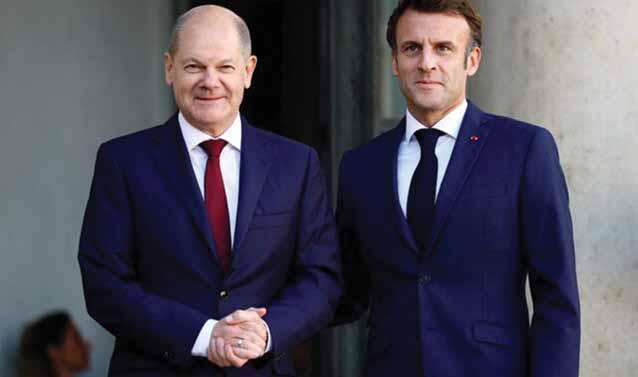
they don’t have the right to attack where the missiles are coming from? It’s as if we were telling them we’re giving you arms, but you cannot use them to defend yourself,” Macron said late Tuesday during a press conference in Meseberg, Germany.
Macron was joined by German Chancellor Olaf Scholz, who agreed Ukraine should be allowed to defend its territory as long as it respected the conditions of the weapons suppliers.
Russian President Vladimir Putin warned of serious consequences if Russia is struck with Western weapons. That came as Ukrainian President Volodymyr Zelensky’s made a two-day
tour of Europe, during which he visited Spain, Portugal and Belgium and received more promises of military aid.
BLINKEN VISITS MOLDOVA TO BOLSTER SUPPORT FOR UKRAINE
In other news, US Secretary of State Antony Blinken on Wednesday headed to the Moldovan capital of Chisinau, the first stop of a short European tour intended to bolster support for Ukraine.
Blinken met with Moldova’s pro-European President Maia Sandu as US officials say her country, which shares a long border with Ukraine, faces Russian “influence operations.”
Blinken announced support worth $50 million to help Chisinau transition away from Russian energy dependence and further integrate with the EU, amid warnings of heightened hybrid threats from Russia.
This support will "bolster the ability of Moldovans to resist Russian interference, to hold free and fair elections, to continue down the path to the European Union and Western integration, and to create more economic opportunity," Blinken said.
The top US diplomat will travel to Prague to join a gathering of NATO foreign ministers, ahead of the alliance’s leaders’ summit in July.
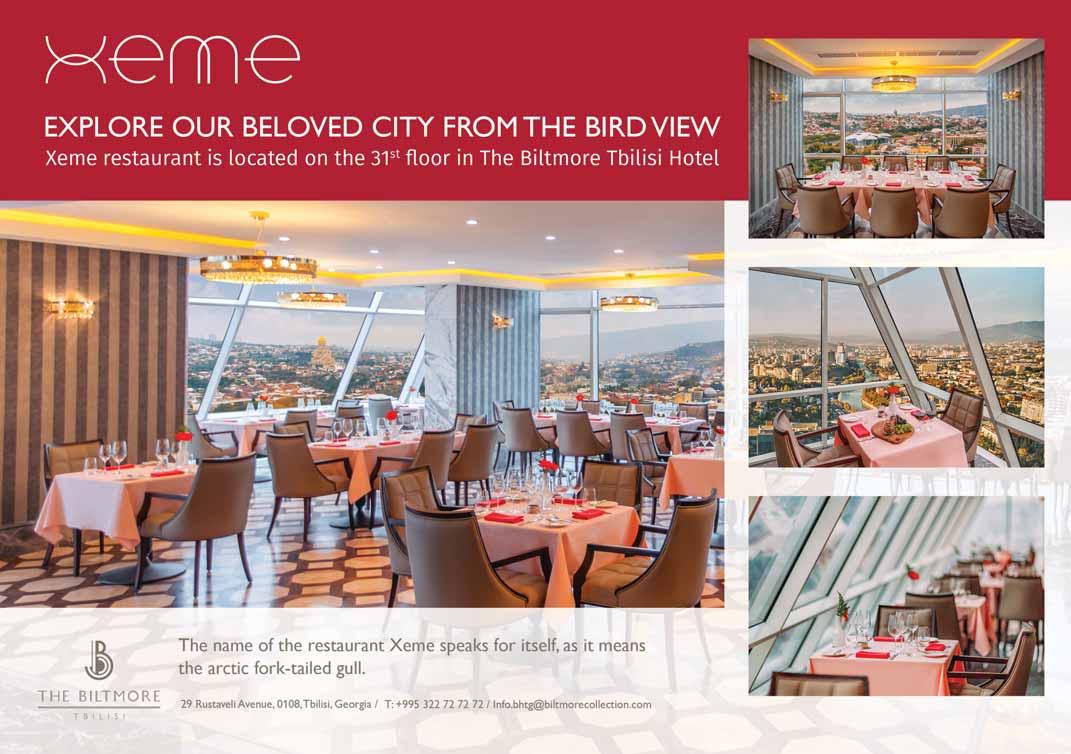
On May 28th, amidst protests and political tension, the ruling Georgian Dream majority made a decisive move, overriding the president's veto on the Transparency Law, also known as the "foreign agents law." This legislative maneuver has left many pondering the future implications for the country's civil society and international relations.
The Transparency Law, as an independent piece of legislation, aims to address concerns regarding foreign influence within Georgia's media and non-governmental sectors. At its core, the law mandates that organizations receiving over 20% of their funding from abroad must register as "organizations acting in the interest of a foreign power." Non-commercial legal entities, including non-profit organizations, foundations, and NGOs, are among the primary entities affected by the law. Those receiving a substantial portion of their funding from foreign sources will be required to register and disclose relevant information. The registration process will entail stringent audits and financial declarations, overseen by the National Agency of Public Registry of the Ministry of Justice of Georgia. The law defines organizations representing foreign interests as “non-profit entities that receive a substantial portion of their funding from foreign sources.”
This definition excludes state organizations, but encompasses broadcasters and print media, including online platforms. Additionally, indirect contributions from foreign powers are considered within the scope of disclosure requirements.
Foreign powers are broadly categorized
as “nations other than the host country,” encompassing a range of entities such as individuals and organizations operating beyond national borders. This definition implies that all entities with foreign affiliations, regardless of their legal status or geographical location, fall within the scope of assessment.
Foreign governments, as well as people who aren't from Georgia, are considered foreign powers. Businesses and organizations outside the country are also considered within this definition, including companies, groups, and foundations.
Within this framework, organizations and other relevant bodies aiming to establish or maintain their legal standing must submit applications to the public register, furnishing comprehensive details regarding their finances and objectives. Registration is not a one-time obligation, but an ongoing requirement. Registered organizations must submit annual financial declarations to the agency, detailing their financial activities for the preceding year. Non-compliance with this requirement may result in fines or deregistration. The law includes provisions for enforcement, and penalties to ensure compliance. Failure to register or provide financial declarations within specified timeframes can result in fines, with penalties ranging from 10,000 to 25,000 GEL, depending on the severity and recurrence of the violation, with a maximum time limit for prosecuting administrative offenses set at six years.
The passage of the Transparency Law has not occurred in isolation, but against a backdrop of political turmoil and societal unrest. The characterization of the law, being akin to Russian legislation, has fueled public outrage and galvanized opposition forces. Critics argue that it undermines Georgia's democratic credentials and erodes trust in its institutions.
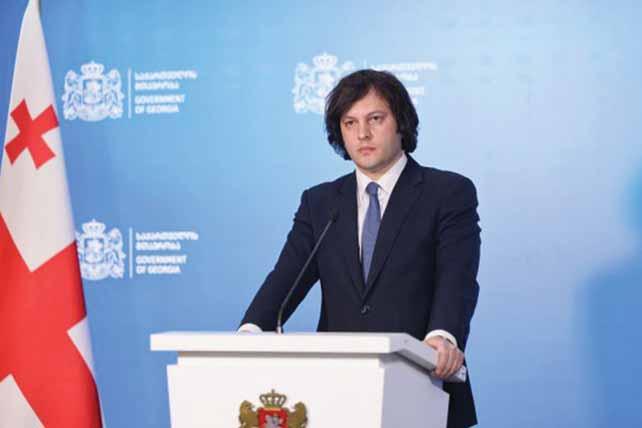
The proponents of the law argue that it is a necessary measure to safeguard against undue foreign interference and ensure transparency in the flow of funds to NGOs and media outlets. However, critics have been ringing alarm bells, labeling it as a tool to suppress dissent and stifle political opposition, particularly in the lead-up to the parliamentary elections in October. Critically analyzing the Transparency Law unveils a complex web of legal, ethical, and human rights considerations. The law's requirement for public reporting of foreign donations and registration of organizations raises concerns regarding the infringement of fundamental rights, including freedom of association, expression, and privacy.
Under international human rights instruments and Georgia's own constitution, restrictions on these rights are permissible only under strict conditions of legality, legitimacy, and necessity/proportionality. The law must have a clear legal basis, pursue legitimate aims, and demonstrate necessity in a democratic society. Furthermore, any restrictive measures must not be discriminatory in nature or effect.
PRESIDENT ZURABISHVILI PROPOSES REFERENDUM AMID PROTESTS
When President Salome Zurabishvili addressed the opponents of the law on the night of May 28, she proposed a referendum to clearly determine the will of
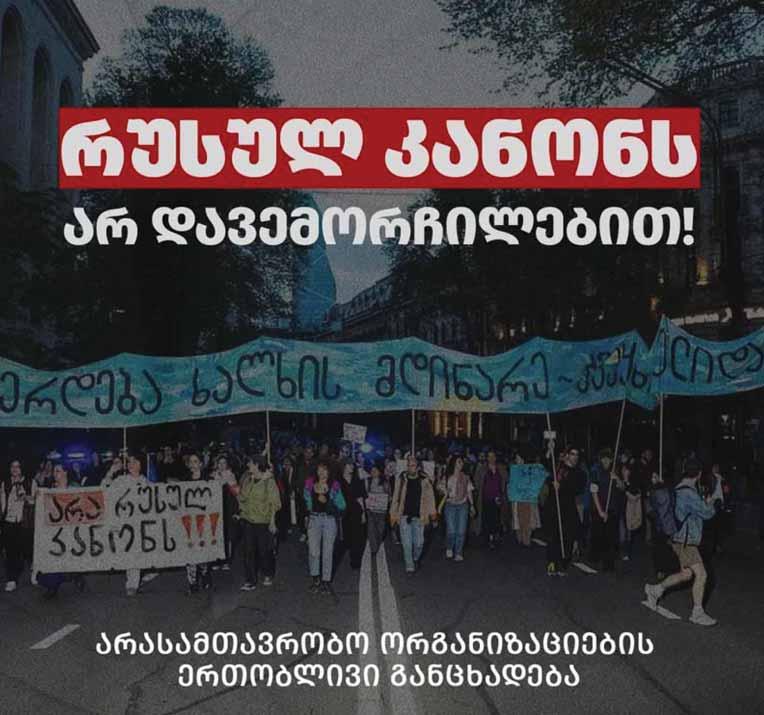
the Georgian people regarding their future trajectory: A European future, or what she terms "Russian slavery." The president emphasized the need for citizen engagement, urging the collection of signatures to initiate the referendum process. She affirmed her readiness to sign the referendum, highlighting the importance of collective decision-making in shaping the country's path forward.
In response to the protests, President Zurabishvili reiterated her solidarity with the citizens gathered on Rustaveli Avenue, and emphasized the distinction between friends and enemies of the country. She pledged her support to the Georgian people, affirming her presence alongside them in their pursuit of national interests.
Georgia's NGOs said this week that the new law will remain a piece of paper and have declared disobedience
“55 days ago, the government broke the word given to the Georgian people and re-introduced the Russian law. They wanted to break the civil sector by passing this law, but they received unprecedented unity and tireless opposition. The Georgian people firmly defended and will continue to defend their European future and will never get used to living under the Russian boot. Russian law will not work in our country! It will remain a piece of paper that no one will obey!
“The authorities knowingly created a threat to the economy, international reputation, civil order and peace of our country. They did this on purpose, so that the citizens of this country could no longer help each other. But we have been proving for 55 days that people never get tired of loving their country. Our protest and struggle will continue until this law is repealed!
“They tried to intimidate us with special forces, beatings and swearing, arrests and illegal fines, but they did not consider that nothing can stop us from doing the righteous thing called helping people. We will continue our work – we will help people and each other and we will not obey the Russian law!
“We will not leave anyone alone, we will protect everyone arrested and fined. Our lawyers will fight in domestic and international courts. We will collect money to pay each other’s fines imposed on us for the love and freedom of Georgia.
“Our struggle is seen and supported by the whole civilized world. With the adoption of the Russian law, monitoring of the elections is in danger, but we, Georgian civil organizations, promise to protect the elections and the vote of each citizen. We will be with you at every polling station and we will observe to protect free and fair elections!
“This is Georgia! We will not become Russians! Georgian people will once again excite the whole world with their fight for freedom.
“We declare disobedience – no to Russian law! Yes to Europe”, reads the statement.
British writer Keir Giles is considered an expert on the Russian military, having written multiple books on the geopolitical conflict between the West and Russia, among them NATO's Handbook of Russian Information Warfare for the NATO Defense College. Giles has commented extensively on the Serdyukov reform, Russian disinformation, and the Russo-Ukrainian war. Radio Free Europe/RL’s Georgian Service sat down with him to discuss Georgia’s much-protested foreign agents law, Putin’s thinking, and the Ukraine war. We started by asking Giles about Russia’s recent government reshuffle.
“I don't think the reshuffle changes anything at all,” Giles tells us. “It is a means of either internal score-settling, or trying to fight the war effectively, but it doesn't change the overall direction of what Russia wants to achieve; it's just looking for ways to do it better.
“I also got the impression that Patrushev, who’s now tasked with both advising Putin and shipbuilding, was just Peskov throwing us an example of the things that he would be doing, as opposed to saying, ‘this is his main job.’ So, Patrushev was never going to be sidelined altogether. His toxic ideology is still going to be a major part of Putin’s policy.”
IF IT IS INTERNAL SCORE SETTLING, THEN WHO’S SETTLING THE SCORE, AND WITH WHOM?
There's been speculation for a long time about Shoigu, the network of corruption that he leads being on the way out. And, of course, when these things happen in the Kremlin, it's always extremely hard to determine the overall direction of trouble until it is all over. Like that old Churchill quote about Bulldogs fighting under a rug: You know something is going on, because you can hear the growling and the snarling, you don't know who’s winning until the bones fly out at the end. And that's exactly the situation we've got here. With each new high profile arrest, you have theories developing as to exactly what is happening. But the overall shape of the new Ministry of Defense won't become clear until all the shouting is over.
THE APPOINTMENT OF BELOUSOV, AN ECONOMIST WITH NO MILITARY EXPERIENCE, AS DEFENSE MINISTER- DOES IT TELL US THAT PUTIN WANTS TO KICK INTO FULL-GEAR WAR ECONOMY? AND IF SO, WHAT ARE THE EXPECTED RESULTS?
That is how it is being interpreted: Recognition that this is a long war, and it's an industrial war and a war of production. And, furthermore, that this is a war that Russia has to be able to afford to continue. And that means that the former understanding that widespread corruption was part of the business may no
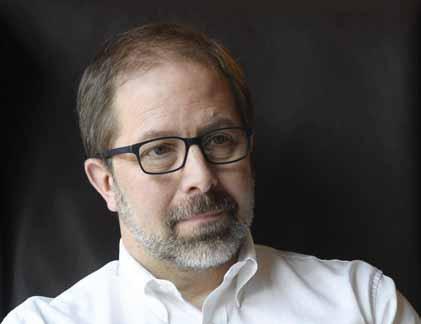
longer be acceptable, because what Russia does not want to do, and Putin has said this repeatedly, is once again spend itself into state collapse in pursuit of an unwinnable war.
SOON AFTER THE GOVERNMENT WAS RESHUFFLED, PUTIN REGALED US WITH ANOTHER PEACE PROPOSAL, WHICH WOULD MEAN FREEZING THE WAR AT THE CURRENT FRONTLINES. HOW WOULD YOU INTERPRET IT?
This may or may not be something genuine, as Russia wants to negotiate from a position of advantage, especially if that involves any form of backing for their claims to the territory that they're currently occupying. If so, then there's no reason for Russia not to take that, but that's the same issue as we had right from the very beginning of this conflict.
WHAT CAN THE RUSSIAN PUSH TOWARDS KHARKIV ACHIEVE?
HOW DOES IT CHANGE THE POWER BALANCE IN THE WAR, ESPECIALLY WHEN IT COMES TO WESTERN SUPPORT?
It’s looking as though that’s not happening, because what we hear from the frontline is that it has been stabilized. It was also widely assessed before this offensive started that the number of
troops Russia had amassed was not going to be sufficient to actually take Kharkiv. But the other proposal that has been made is that what Russia wants is a buffer zone of control of Ukrainian territory across the border to put an end to the Ukrainian raids into the Belgorod region. And if so, then they would have been assisted, of course, by the US saying that Ukraine cannot use them to strike Russian territory.
DO YOU THINK THAT’S GOING TO CHANGE? THERE HAVE BEEN WIDESPREAD DISCUSSIONS IN AMERICAN POLITICAL CIRCLES WHETHER TO FINALLY GIVE UKRAINE THE GREENLIGHT TO HIT RUSSIAN POSITIONS IN RUSSIA.
If that were the case, it would fit the pattern of the United States doggedly resisting doing the right thing for Ukraine until a year or two too late. So we shouldn't rule it out, because so many firm vetoes from the US have turned out to not be honored and respected in the end. However, of course, as with so many others, the damage has already been done. Very many lives have been lost as a result of these nonsensical restrictions.
AS WELL AS BATTLEFIELD ADVANTAGES.
Exactly. And it’s a spectacular success
If the ruling party in Georgia does succeed in suppressing civil society with the aid of this law, then that plays into Russia's hands
for Russia that they have manipulated the minds of policymakers in the United States into granting Russia this unilateral advantage, and the United States treating it as more important to protect Russian military assets than to protect Ukrainian civilians.
IF I WERE TO ASK YOU TO DISSECT THE AMERICAN THINKING, WHAT’S THE LOGIC BEHIND DRAWING THIS RED LINE?
Well, lots of people have speculated as to why this may be. In July 2023, I went with a team from Chatham House to Washington, DC to try to understand what the thinking was behind it. I got many contradictory explanations; some people were saying the most obvious reason was the United States’ believing Russia's nuclear rhetoric and the threats that everybody else has already discounted.
But in many conversations, when we worked through all the reasons why this was illogical, the final position of our US interlocutors was that this was the position that President Biden had taken, and therefore they were obliged to follow it. So all of the rationales do come back to the White House.
WHAT’S PRESIDENT BIDEN’S LOGIC THEN?
We don't know. Because the only things he has said publicly about this idea show
that he has somehow bought into the Russian nuclear intimidation and the Russian nuclear nonsense, and the flouncing, because his justifications have always been about World War Three, Armageddon, and so on, echoing those phrases that come from Russian mouthpieces.
LET’S MOVE ON TO GEORGIA NOW, WHERE THE GOVERNMENT FINALLY ADOPTED THE MUCHPROTESTED FOREIGN AGENTS LAW. IF YOU LOOK AT IT FROM THE KREMLIN PERSPECTIVE, WHAT DO YOU SEE?
There's a prospect of leverage here, and a prospect of Russia being in a win-win situation, because the response by the West to the passage of an anti-democratic law like this is likely to be to sideline Georgia still further, to set back Georgia's aspirations for European integration, which, of course, is entirely suitable for Russia, and they will be very content with this outcome.
If the ruling party in Georgia does succeed in suppressing civil society with the aid of this law, then that too plays into Russia's hands, because it makes it far easier to work with an autocratic regime in Tbilisi that is not subject to democratic oversight and civil society to the same extent.
THE GREATEST FEAR IN GEORGIA RIGHT NOW IS THAT IF THIS TREND CONTINUES, GEORGIA WILL FIND ITSELF FIRMLY BACK IN RUSSIA'S ORBIT, IN A PLACE NOT TOO DISSIMILAR TO WHERE ARMENIA WAS A DECADE AGO. HOW JUSTIFIED DO YOU THINK THOSE FEARS ARE? They are entirely justified, because Russia will never have lost sight of the long term objective of regaining control over all of the countries that President Putin has stated very clearly he thinks ought not to be independent and wants still to be governed from Moscow. And if there are opportunities to increase Russia's influence, without the extraordinary expense of actually going to war, as they've done with Ukraine, Moscow is certainly going to take them.
Very many
lives have been lost as a result of these nonsensical restrictions
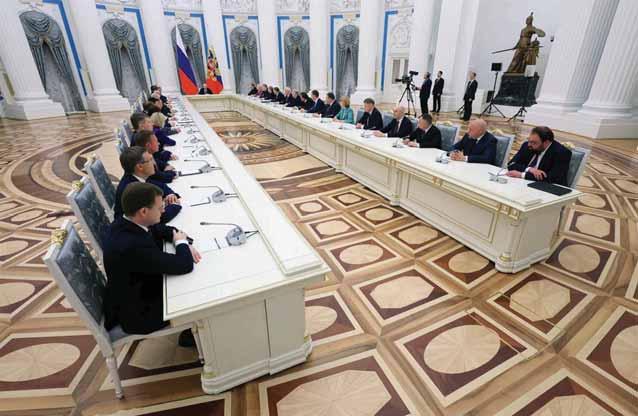
THE PRIME MINISTER SAID THAT BY 2030, GEORGIANS WILL BE REUNITED WITH THEIR OSSETIAN AND ABKHAZIAN BROTHERS. MOST INTERPRETED THIS AS A DEAL BEING MADE WITH RUSSIA. WHAT ARE THE REALISTIC CHANCES OF RUSSIA EVER WILLINGLY CEDING CONTROL OVER THOSE TERRITORIES?
I can see no rationale for Russia to relinquish control of the occupied territories unless it is sufficiently reassured that it has control of the whole of Georgia [so] that it makes no difference.
It’s a successspectacular for Russia that they have manipulated the minds of policymakers in the United States
Communications Construction Company Ltd, together with China Harbor Investment — was selected as a private investor for the construction of the new deep-water port of Anaklia.
The Minister of Economy and Sustainable Development, Levan Davitashvili, said that a Chinese consortium will be announced as the winner of the Anaklia port project in the coming days.
“In the end, we received a proposal only from the Chinese consortium. In this case, the detailed application proposal is complete, the relevant bank guarantees have been presented. Therefore, in the coming days we will clarify the details, after which we will declare the Chinese consortium as the winner and start negotiations on the partnership agreement. I think this is a very important stage. This project is of great importance, and will employ many people,” said Davitashvili.
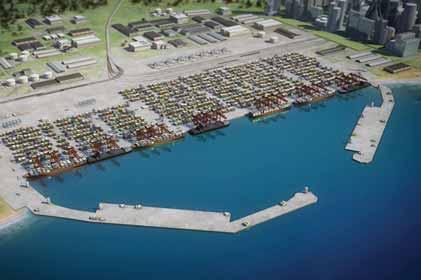
On December 24, 2017, the then Prime Minister Giorgi Kvirikashvili and Mamuka Khazaradze, the founder of Anaklia Development Consortium, officially opened the port construction in Anaklia. On January 9, 2020, during the prime ministership of Giorgi Gakharia, the Govern-
ment of Georgia announced that it was terminating the contract with Anaklia Development Consortium, which was to have built the Anaklia Port, due to nonfulfillment of its obligations. The Anaklia Development Consortium included Conti International (USA) and TBC Holding (Georgia). Anaklia Development Con-
sortium (ADC) and its Dutch investor Bob Meyer are conducting an ongoing arbitration dispute against Georgia.
In order to select a private partner for the project, the government started preparatory work to announce a new selection process in the second half of 2022.
The Anaklia Deepwater Port Development Agency hired international consultants (in commercial issues – MTBS, and in legal issues – Squire Patton Boggs), with whose involvement the documentation for the selection process was prepared.
On September 20, 2023, the Ministry of Economy announced that two companies had moved to the second stage of the private partner selection of the Anaklia Deepwater Port project. Although they were not named, we were told they were Swiss-Luxembourgish and Chinese-Singaporean companies.
According to the minister, only four companies expressed their desire for private partnership in the construction of the port. Of the two companies that failed to move to the next stage, one was from Israel, and the other also from China.
Yet, last year, European Commissioner for Transport Adina Valeani said that
European companies were also interested in the port of Anaklia, and President of Azerbaijan Ilham Aliyev stated that Baku is interested in implementing joint projects with Georgia, including Anaklia port. However, if we rely on the information provided by the Georgian government, they did not show their desire for private partnership in Anaklia port by participating in the competition.
As a result of the qualification-evaluation of the candidates, the candidates were given a period of several months to present a technical, commercial and financial proposal, as a result of which the commission identified the winner.
In parallel with the process, the state established a company that started preparatory works for the construction of marine infrastructure (dredging, breakwater). According to the Ministry of Economy, part of the land plots required for the first phase of construction works will be transferred to the same company as a capital contribution.
Together with the private investor, a port construction joint company is to be established, where the state will own 51%, and the private partner 49%.
 BY SHELBI R. ANKIEWICZ
BY SHELBI R. ANKIEWICZ
Phanjakidze. “It might be bad, and they made the trip for no reason. With online shopping, it gives us choices. On a website, there are multiple options, but if you go in person there might only be two.”
Although Georgia’s average is still significantly lower than that of countries in Europe, according to the Galt and Taggart report, e-commerce will continue to increase due to several factors: Users will become more inclined to shop online, people will begin to spend more annually, and local online retailers will rack in more funds through international spending.
Several shipping companies have sprung up to take advantage of this growing e-commerce trend, and regularly seek to introduce innovative novelties to spur the growth of the sector.
Among them is Georgian shipping company USA2GEORGIA. Founded in 2008, USA2GEORGIA is a part of the International Air Transport Association, which allows shipments to/from different countries worldwide. The company has added three top trading partners, including China, the United States, and Turkey, over the past few years.
On May 28, the company announced the launch of its new brand, CARGO2GEORGIA, which will allow customers to be able to receive full and group ocean shipments from China and the US, and road shipments from Turkey.
“CARGO2GEORGIA aims to optimize the international cargo transportation system by providing a wide range of services for small, medium-sized, and large businesses,” the company wrote in its press release. “This includes cargo transportation from the company's warehouses or off-site loading, along with customs services in Georgia.”
According to the Observatory of Economic Complexity (OEC), an online distribution platform based on geographic economic activities, Georgia’s imports in 2022 were primarily from Turkey, China, and the US, along with Russia and Germany. These observations align with USA2GEORGIA’s statement, which explains that the number of products imported from these top three countries continues to increase. Due to this consistent rise in imports, CARGO2GEORGIA was created for people to buy more prod-
ucts internationally, at a competitive rate, with greater efficiency.
Under the USA2GEORGIA name is LOCKER.GE, TURKEY2GEORGIA, CHINA2GEORIGA, and now CARGO2GEORIGA. Presently, the amount of cargo that is transported internationally is nearly eight million units, according to the brand’s website. With its new venture, the company hopes to use its experienced logistics team, paired with international partners and technology, to promptly deliver services at a reasonable price.
“By introducing CARGO2GEORGIA, USA2GEORGIA further expands its service offerings, providing complex logistics solutions for international cargo transportation,” it wrote in its press release.
“These new services contribute to the growth and diversification of products available in the Georgian market, benefiting both businesses and individual consumers.”
Other companies in Georgia, such as DHL, a German logistics company, also deliver shipments worldwide. Through this service, items can be bought and brought to any country, using the customer’s transportation of choice, be it road, air, or ocean. Another service, KiwiPost, is also increasingly popular in Georgia, delivering packages to and from the US, United Kingdom, Turkey, China, and Greece.
USA2GEORGIA originally opened its branches in Tbilisi, but in recent months has been expanding to other areas of the country. At the moment, there are 11 branches in Tbilisi, one in Batumi, and one in Kutaisi. One thing the company prides itself on is the development of self-service terminals, first introduced here a decade ago, to decrease the time spent picking up shipment orders, a feature which has since been taken up by others in the business, KiwiPost among them.
“Recall that the idea of self-service terminals did not exist in the world until 2015. It was first developed by the company USA2GEORGIA and successfully implemented in our country. Thanks to this novelty, the reception of parcels became even easier and faster,” the company boasts.

In June 2024, Batumi, known as the crown jewel of Georgia's Black Sea coastline, got a dynamic new addition to its hospitality landscape with the opening of ibis Styles Batumi. This 121-room retreat, the latest offering from French Accor, seamlessly blends affordability with distinctive design, promising guests an unforgettable experience.
Accor Group has firmly established its presence in Georgia, with a total of ten hotels offering diverse experiences across the country. From the vibrant heart of Tbilisi to the serene landscapes of Batumi, Accor's properties cater to every traveler's needs. Accor's portfolio in Tbilisi encompasses a variety of hotel types, catering to different preferences and needs. From luxurious and contemporary establishments to centrally located options offering convenience, culturally immersive experiences, budget-friendly accommodations, and vibrant atmospheres, there's a diverse range of choices
available to guests visiting the capital city.
Batumi emerges as a promising frontier for Accor's expansion in the region. Nestled along the Black Sea coast, Batumi exudes a distinct charm with its palmlined boulevards, pebble beaches, and bustling nightlife. And now, Accor makes its mark in this coastal gem with the introduction of ibis Styles Batumi. For Accor, Batumi represents an opportunity to redefine hospitality in the region. With the eco-friendly ethos of ibis Styles, the brand introduces a refreshing concept centered around sports and familyfriendly comfort. It's a theme that resonates with the city's vibrant energy, appealing to both leisure and business travelers alike.
Each hotel in Accor's portfolio in Georgia offers a distinct experience, showcasing the brand's commitment to providing diverse options for travelers while maintaining the highest standards of
hospitality. Renowned for their innovative approach to hospitality, ibis Styles hotels prioritize unique design, warm service, and accessibility. With 670 properties worldwide, each boasting its own theme, ibis Styles Batumi draws inspiration from sport enthusiasts and fans, infusing the property with a dynamic sports-themed atmosphere that resonates with the spirit of the city.
Alexis Delaroff, Chief Operating Officer of Accor New East Europe, expressed genuine enthusiasm about the group's venture into Batumi, emphasizing the city's unique blend of historical charm and contemporary allure as a magnet for travelers. With 10 properties already operational in Georgia and over 20 more in the pipeline, Accor is poised to significantly impact the country's hospitality landscape. Nestled within walking distance of Batumi Boulevard and its picturesque seafront park, ibis Styles Batumi not only offers convenient access


to the city's attractions but also boasts breathtaking views of the surrounding landscape. The hotel's vibrant ambiance, characterized by playful design elements and vibrant colors, reflects Batumi's status as a 2019 European City of Sport.
Whether guests are visiting for leisure or business, ibis Styles Batumi caters to their needs with an array of amenities.
From a dedicated kids’ corner and children’s restaurant menu, to a fully equipped conference venue, the hotel ensures a comfortable and seamless stay for all.
As ibis celebrates its 50th anniversary this year, ibis Styles Batumi underscores the brand’s commitment to providing stylish accommodations at an affordable price point. Guests can also enjoy access to Accor’s loyalty program, ALL - Accor Live Limitless, unlocking a host of rewards
and experiences with every stay. In a city that celebrates sports and embraces innovation, ibis Styles Batumi emerges as a beacon of hospitality, inviting guests to immerse themselves in the best of Georgia’s Black Sea coast in comfort and style.
More than just a hotel, ibis Styles invites guests to embark on an adventure where every stay is a celebration of creativity and comfort. With over 670 uniquely designed hotels across 55 countries, ibis Styles redefines budget-friendly hospitality, welcoming guests with open arms and a smile. As part of Accor, a global leader in hospitality, ibis Styles is committed to delivering memorable experiences. With access to ALL - Accor Live Limitless, guests can enjoy a world of rewards, services, and experiences.
Humanity spends a lot of time, money and energy on mastering foreign languages, and we do this mostly to enhance our quality of life (and, at times, to kill our curiosity, too!). But there are nations in the world who suffer no need to learn a foreign language for survival – those, for instance, who enjoy English as a native tongue. It is so funny, if not deplorable, that the average Georgian is compelled to use a preposterous amount of resources to learn English, with the purpose of contributing their labor to the international marketplace, to be better versed in contemporary issues, and to be ready to handle the everyday exigencies that can pop up at any time. And yet the average native of Britain, America, Canada, Australia, or of any other English-speaking country, can feel blissfully free to roll on with the help of their own tongue, spoken, by some divine luck, internationally; not bothering themselves with the pain in the neck called “learning a foreign language.”
While a regular Georgian kid will have to spend hours on a daily basis, if not months and years in general, learning English, the English-speaking child can spend the same amount of time imbuing science, art and technology, making overall progress much faster. The difference might sound heartbreaking, but that’s where we live and work. Take a Georgian businessman, for instance, who has to use enormous amounts of will and time to Learn English so as to feel
self-confident in the process of regular business talks or wider international negotiations. Meanwhile, the English native speaker can feel free from that imposed obligation to excel. Moreover, no matter how much or how diligently a Georgian businessman studies the language, he will never feel, within that artificially learned language, as comfortable as his English-speaking counterpart, who has a much bigger chance of sounding more educated and civilized than the person who has a problem expressing himself fluently, thus being unable to make a more powerful impression on the other side - all to the considerable detriment of the English-learning party and to the great benefit of the Englishspeaking side.
When we go abroad, we Georgians certainly want and need to speak English, or any other relevant foreign tongue, for that matter; and vice versa, when we are at home and receive a foreign guest, we feel obligated to speak their language, so as to make the situation amiable and comfortable for both sides. And the reason for this linguistic awkwardness is amazingly simple: we are who we are, and we are born where we are born. English is spoken all over the world, and Georgian is not. This is a disadvantage.
The advantage in communication goes to the side who speaks the more popular language, and the advantage is a natural chance to better express one’s thoughts, thus exuding a stronger influence over the circumstances. Yes, there are interpreters who can help, but that’s a horse of a totally different color.
There is one other disadvantage that a smaller-language speaker might suffer.
If my English-speaking collocutor finds
out that I have no idea who the great William Shakespeare is, he will be surprised to stupor; yet if the selfsame guy has no clue who the great Shota Rustaveli is, no raised eyebrows will follow at his ignorance. Why? Because of the difference between the size, history, importance, influence and recognizability of nations, which means that we are not cut from the exact same cloth. The only
noble way out in this kind of cultural debacle is the tolerance that the contemporary and democratically-oriented world is teaching us persistently: Yes, there is a linguistic and cultural discomfort that makes us feel different, even superior or inferior in some unfortunate cases (if compared), but we hope that our good Planet is gradually becoming a better place to live in, and if it does, we will certainly learn how to appreciate each other, taking in stride all those advantages and disadvantages while socializing with each other. If I have to learn a foreign tongue, I will, and will do it without much whining, but it will remain a tremendous pleasure to know that the big-language-speakers are not loath to learn our Kartuli. It helps greatly when in Sakartvelo, if nowhere else!
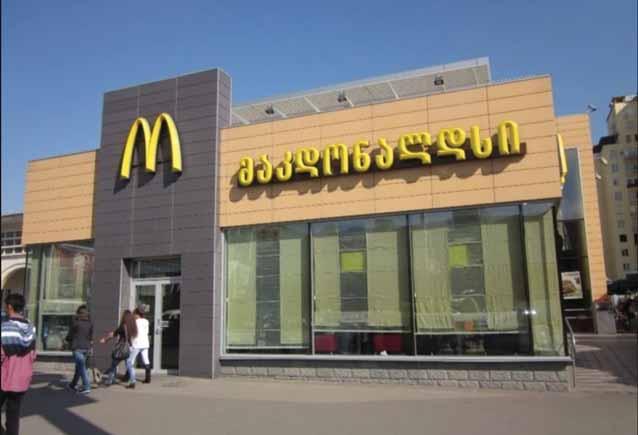
 BY TONY HANMER
BY TONY HANMER
The story goes that Svaneti’s, Georgia’s and indeed Europe’s highest village is named as a contraction of the Georgian words for “Fearless Heart” (or simply Braveheart!),
“Ushishari Guli”. Whether this is true or not, I am in no position to judge. The only thing I will add is that this interpretation means that this Svan village has a Georgian name. But it can also be identified on some maps, as can other villages, by the name of its main hamlet, which is Chazhashi, which comes from the Svan word chazh, which means “horse”. So there is that.
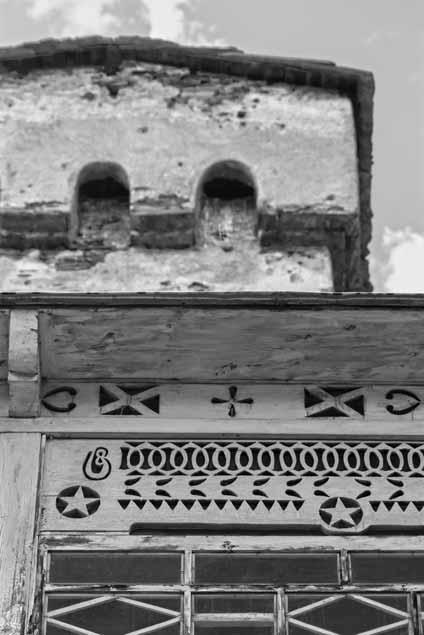
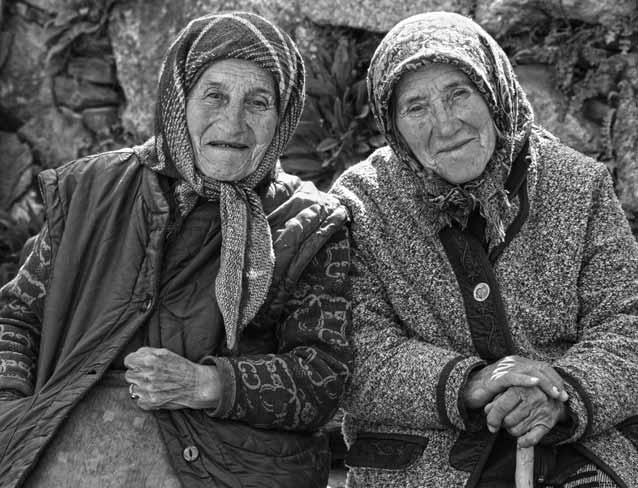
I have found myself back here for a couple of days and nights, driving and guiding two friends of mine who are doing Svaneti research for a creative project. We are staying (of course) at Villa Lileo, the renamed hotel of Dato Ratiani and Nanuli Chelidze-Ratiani, my long-time friends and hosts when I lived here and taught English for the entire winters of 2007-9. This family will always be both my friends and hosts here, and their excellent company and delicious, local-ingredient food are always a pleasure. My two friends and I have walked from the very top of Ushguli (Lamaria monastery) to the very bottom: The grave site for 11 family members who died together in the disastrous winter of 1987, during which an avalanche tore through Murqmeli hamlet and wrecked it. Ushguli was on the edge of deciding to evacuate completely and permanently after this. But Dato’s father, Anzor, the then mayor and surgeon of the village, declared that he would be going nowhere. Somehow, he gave enough people the courage to follow his example, and thus the fate of Ushguli, down to 10 families but not empty, was diverted from becoming a ghost town. Anzor Ratiani is hailed as a hero to this day for his decision and its effect.
Mt. Shkhara, Georgia’s highest mountain and the glacial source of the Enguri River, sits about 7 km past the top of Ushguli, though seeming much closer due to its height and the clarity of the air. During our time here, it has appeared out of the clouds only at sunset. For this reason, we have not scrambled up to Queen Tamar’s Summer Fortress, high above the village, which gives spectacular views of both Ushguli and Shkhara when weather obliges. We might just go up there tomorrow morning as I write this, though, if Shkhara plays along.
One thing I have realized is that, despite over a year of accumulated life in Ushguli, and visits in every month of the year, I will always find new parts or angles I have not seen and photographed before. This visit has borne this out.
We also dropped in on Teimuraz Nizharadze, who needs to be known as more than just “Pridon’s brother” now that that slowly more and more famous surrealist and symbolist artist has been dead a couple of years. Teimuraz finds himself in the difficult job of looking after Pridon’s considerable collection of paintings and drawings, not dispersing them to the four winds, and protecting them from the elements in his and his brother’s house-gallery. Teimuraz is also finding his way as an artist, which I am delighted to see and hear about. He will have his own unique style, given time. This visit, I try to encourage him that I do see him more for who he is than for who his brother was. Almost all of Pridon’s art is still not yet for sale, and time is needed to sort out what should best happen to it. Yes, as a fan, I do itch to
own something; but more than this, I want to see the whole archive properly handled. It seems to be in good hands.
So Ushguli continues to surprise and delight, both the first-time visitor and the older hand like me. Trust me, a few hours’ day visit from Mestia cannot be enough; the two are radically different. Give it the time it deserves, and you will be rewarded.
Tony Hanmer has lived in Georgia since 1999, in Svaneti since 2007, and been a weekly writer and photographer for GT since early 2011. He runs the “Svaneti Renaissance” Facebook group, now with over 2000 members, at www.facebook.com/groups/ SvanetiRenaissance/ He and his wife also run their own guest house in Etseri: www.facebook.com/hanmer.house.svaneti
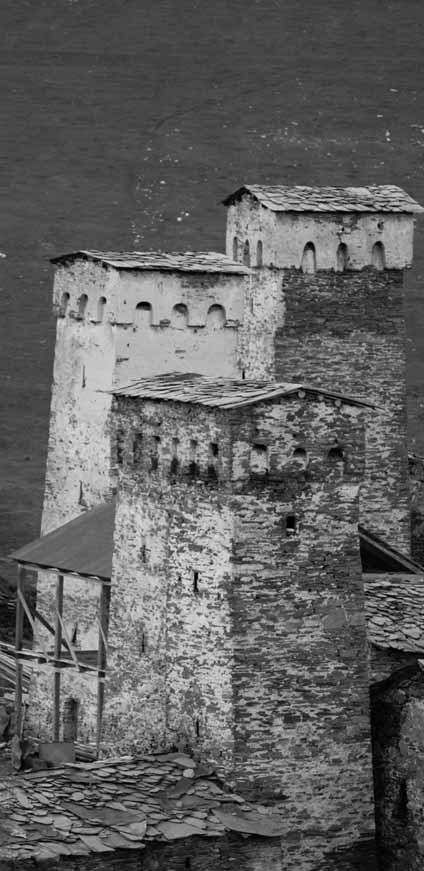
Georgia’s Kakheti region is distinguished by amazingly beautiful landscapes, rich biodiversity, and unique ecological treasures. However, sadly, this natural haven faces a significant challenge – the delicate balance between maintaining a living landscape and the looming threat of desertification.
Recognizing the urgency of the situation, the Kakheti Steppes project, implemented by SABUKO, BirdLife partner, in collaboration with local communities, is working to protect biodiversity and conserve local species.
Building upon the successes of the previously funded ‘Restoring Gallery Forest and Grasslands in the Iori River Valley’ project, the Kakheti Steppes project places a strong emphasis on the restoration of wildlife habitats and fostering collaboration with the pastoralist community. “It is very important for us to involve and cooperate with local farmers. By engaging with them daily, we implement activities together and gain valuable insights from their experience as well. Over the years, their confidence in our work has grown as they see positive results, which ensures long-term benefits for nature and its restoration”, Aleksandre Mikeladze, the project manager. Various innovative initiatives and methods are being carried out on the spot to achieve these goals.
These areas have been used as winter pastures for centuries, but due to the excessive number of sheep, the ecosystem is losing its ability to self-restore, which leads to soil erosion. That’s why quick and professional action is needed now to stop this process and save the country’s unique biodiversity.
As a result of the measures implemented by SABUKO, pasture restoration and protection of local unique species has noticeably improved.
Heavily degraded areas received targeted restoration measures, among them cutting grasses, strategically spreading manure, and employing the technique of mob grazing, aimed at stimulating plant growth and accelerating recovery. E-fences were also installed. The impact of these interventions was meticulously monitored, providing valuable insights into the effectiveness of restoration strategies.
Giorgi Chikorashvili, Natural Resource Manager at SABUKO, elaborated on the recent diligent work of SABUKO to achieve soil and ecosystem restoration on the ground.
“We implemented various combined measures,” Giorgi tells us. “We decided to install electric fences in the protected area of Chachuna, the protected area of Vashlovani and the multi-use areas of Samukhi. The process is still ongoing. Using electric fences is an eco-friendly and relatively new method in Georgia. Prior to SABUKO, almost no one in the Georgian market used electric fences, so as a result of research and learning from international experience, we became ‘pioneers’ in this field.
“Initially, we would place a flock of sheep within the fenced area, which would improve the structure of the soil surface by grazing and trampling. We would then empty the fenced area and, together with scientists and farmers, we would start working on restoring the ground by experimenting, using different methods.
“We set up six one-hectare electric fences in Chachuna Reserve, Samukhi Valley and Vashlovani and started mob grazing in them, that is, we brought a large number of sheep into the fenced
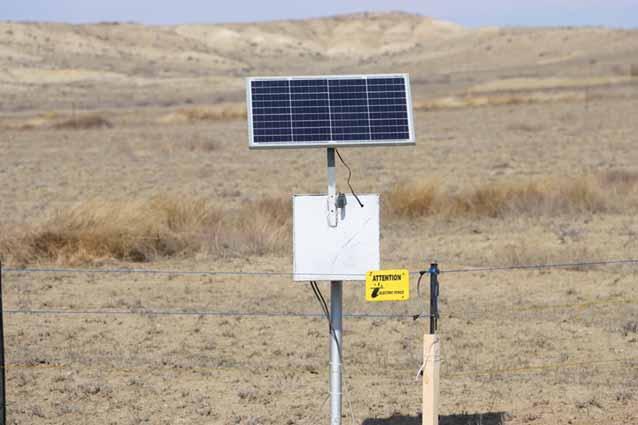
area and let them graze, to prepare the ground for experimentation. After they had cultivated the area naturally with their hooves, within each one-hectare sample area, we arranged four sample sections. By May, we could clearly see the results: In the degraded area where there had been no grass, sowing and manure had led to a great result and very good grass growth. The change was easy to see even with the naked eye. Behind this result was our work, done based on scientific research and with a method proven not only in science but also in farming life. A number of countries do this to "enrich" the ground.
“In this whole process, it is very impor-
tant for us to involve and cooperate with local farmers. We need their support for better results. By actively engaging with the farmers and communicating with them on a daily basis, we were able to implement all the activities together with them. They constantly monitor our activities, give us advice based on their personal experience, which is mutually beneficial, and most importantly, they are ready for novelties. We have seen great progress in this regard, because over the years, their attitude towards our work has changed: They have gained more confidence, because they themselves see these results, which bring only good and do not harm them. Of course,
what concerns nature and its restoration is a long-term process and takes time, and they will see even more beneficial changes and results in a few years.”
Marinus Gebhardt, Grassland Restoration Expert at SABUKO, told us more about the testing interventions carried out by SABUKO on the ground, and their results.
“In meetings with the Agency of Protected Areas and other organizations, there was a request for technical measures to be taken to restore the pastures, especially in very degraded areas,” Gebhardt notes. “To test various measures, we tried grass cutting, organic manure spreading, and treatment with hay. At
some areas, we used a combination to get results. For comparison, we left some test areas as-was. All this experimentation was done in cooperation with local stakeholders, so they could see for themselves what worked.
“Our aim is to control grazing pressure to avoid soil degradation, for which we use electric fences and mob grazing. Mob grazing means that the animals are moved frequently, so that pasture is then given a long period to rest and recover. We believe that mob grazing is a very effective measure for pasture restoration, in combination with other measures. A widely accepted practice worldwide, we were eager to try it in Georgia. Sometimes the electric fences get damaged because the animals are not used to them, but we simply need to “adapt” and make adjustments.
“The important thing is that the result inside and outside the fences is already visible, that hay and manure spreading are especially good measures for pasture renewal. The results in terms of grass restoration are quite promising. Though there have been some issues and challenges along the way, we can say that the results are positive and clear. Visual improvement is one thing, but implementation of these measures needs technique and knowledge, to which we paid a lot of attention. These measures are easily done, and stakeholders can do it themselves.
“Another mission of our team on the ground is raising awareness among local farmers in order to achieve grassland restoration through joint work. Land management measures and mob grazing were somehow an abstract concept for them, but when they see the results and improvement in practice, of course, trust and involvement increases, which makes us very happy and proud! Constant cooperation with stakeholders is really important for us to achieve sustainable results,” Gebhardt says.
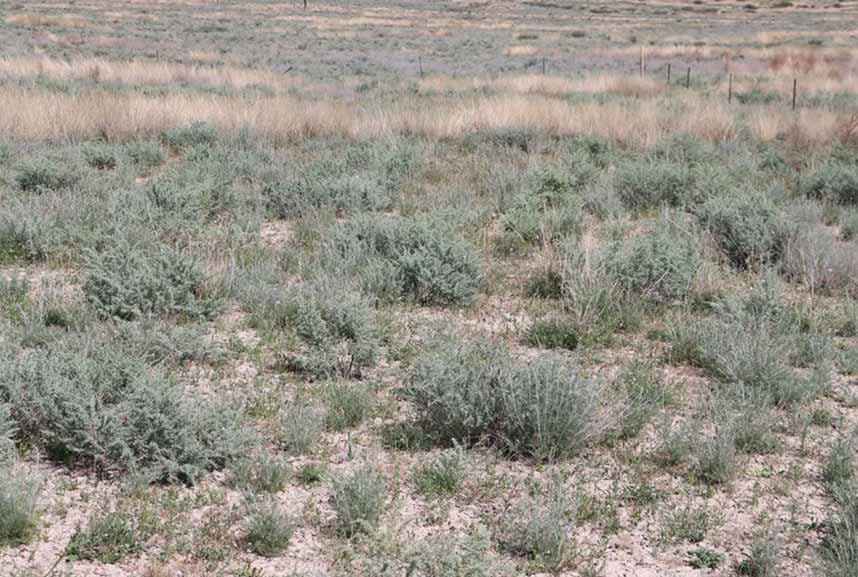
One of my first reports after moving to Georgia was from the Gori Stalin Museum. This was in 2010, when the country was ruled by President Mikheil Saakashvili, who was known as an anti-Soviet leader, the darling of the West. One of the laws adopted under Saakashvili was a ban on the use of any Soviet symbols.
But, strangely, in this most progressive of all post-Soviet countries, in the Stalin Museum, I got the distinct feel of my Soviet childhood. In my hometown of Minsk, there is a similar place, called The Museum of the Great Patriotic War, which every school child had to visit. However, even there, the exposition was not as strongly tied to the cult of personality as in the museum in Stalin`s hometown.
The building of the Stalin Museum is a pompous neo-Renaissance palace, a central urban planning element, solemnly towering over all other buildings. Its construction began during the lifetime of the Soviet leader, and the museum was opened in 1957, four years after Stalin's death. In the courtyard, there is a small house, in one of the rooms of which the son of a poor shoemaker and seamstress Joseph Dzhugashvili spent his childhood. To the side of the museum is the trailer-mounted armored railway carriage, in which the head of the Soviet state used to travel.
The building itself and its artifacts are remarkable, and even a little frightening. But most shocking was the style of the excursion offered in the museum. It was hard not to feel the strong Soviet presence, and, to me, it felt as if the collapse of the Soviet Union was someone's absurd invention or, perhaps, a stupid dream.
Filled with a sense of pride in the great Soviet country and its leader, the guide spoke in detail about the milestones of the life and struggle of the "great father of the nations." In the entire huge museum, with its pompous ceremonial staircases and huge halls packed with soviet artifacts, there is only one tiny room under the stairs dedicated to the fact of Stalin's repressions, the atrocities of the NKVD, and with the history of the so-called Abkhaz War and the blitzkrieg in August 2008.
After that first visit to this strange museum, my reality split in two. On the one hand, I had come to live in a country whose changes for the better made even the most advanced Western powers gasp.
The fight against corruption, reforms in the system of Internal Affairs, higher education, taxation, as well as the creation of exemplary Houses of Justice, where any document and any certificate can be issued in just half an hour - this was the business card of the new Georgia and its young president, who came to power in the course of the no less impressive peaceful Rose Revolution. On the other hand, this exemplary Western-style country had a Soviet past that was stuck in its throat like a huge undigested lump. And it still remains.
As I learned later, in the Saakashvili years, there were many different initiatives to change the exposition of the Stalin Museum. One of them was its transformation into the Museum of Soviet Propaganda, into something akin to the Holocaust Museum. All these attempts failed, though the Museum of Soviet Occupation was opened in a hall of the Simon Janashia Georgian National Museum in Tbilisi to tell of the above mentioned atrocities, 100 kilometers away from the veneration-loaded Stalin Museum in Gori. Who knows why the attempts to change the focus of that old museum failed. Perhaps its management (or even the country itself) did not see
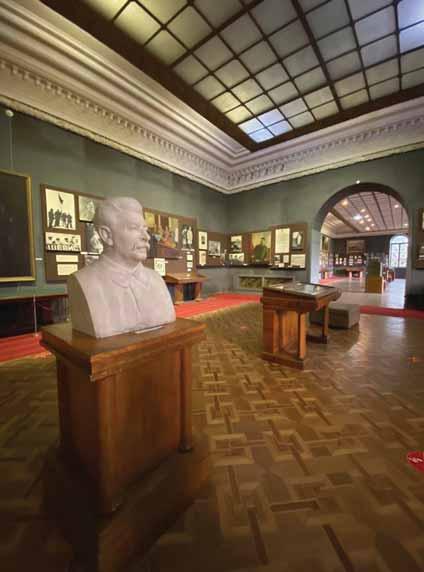
FB
Source:the need to change. After all, visitors by the bus load flock to this holy of holies of the city of Gori - the Stalin Museum is the most visited museum in Georgia!
A SECOND VISIT IN 2024
This year, I visited the city of Gori and the Stalin Museum once again. Zero changes were waiting for me! For the sake of objectivity, I will say that our wonderful guide Olga, a museum employee with 40 years’ experience, was ready to discuss with us several controversial issues of Soviet history and the biography of Joseph Stalin. However, as Olga told me at the very beginning of our conversation, she would not share her attitude towards the leader with me.
She said everyone has his or her own attitude towards this person - and this
was not our business.
Standing at the map of the Russian Empire, where all the places of arrests and exiles of Comrade Stalin are marked, it was funny to listen to fascinating stories about the wanderings of the future leader and his escape attempts.
"For his revolutionary activities, Stalin was arrested seven times," the guide told us. "He was arrested in Batumi, then in Baku, and then St. Petersburg. He was exiled to Siberia several times. He managed to escape from all exiles except the last one, which was near the Arctic Circle. He tried to escape twice, but both times he was taken back, severely beaten, so that his left hand was damaged, which made it permanently shorter than his right hand."
"Were all these arrests really connected
to political activities?” I asked. “After all, there are rumors that Stalin, among other things, was engaged in bank robberies, in particular, on Yerevan Square in Tbilisi."
"What are you talking about! There were no crimes! And no confirmation of this has been found!" Olga exclaimed, throwing her hands up. “He did not do such things. For money, there were other, ordinary party members. And Comrade Koba [Stalin’s pseudonym], was originally a member of the Politburo, a great thinker, author of many important articles!"
At this point, Olga told us about a secret printing house in Tbilisi, where, for several years, Comrade Koba and his colleagues printed leaflets in three languages.
"Is it true that Stalin nevertheless protected some of his fellow countrymen from the repressions?" I asked.
"Actually, many were protected," Olga told me. "For example, the Soviet constructor Korolev, who was exiled to the island of Sakhalin, wrote a letter to Beria, and after that he was released. But for this, it was necessary to find a way to reach the right person. Millions of people were in exile, and neither Stalin nor Beria could know who was specifically there; they did not know the names or surnames of these people. And so, if the exiles had appealed to Stalin or Beria, and if they could not find evidence of crimes committed, maybe the prisoners would have been released."
"How surprising! After all, Stalin was the ‘father’ of those great purges!" I exclaimed.
"Yes, this was allowed in the country, such was the method of struggle then," Olga answered. "But they could not be responsible for each person specifically. The machine was launched, and those who fell under it became victims."
The spacious halls of Stalin's Valhalla are filled with visitors. For some reason, I could not help but notice the large groups of Indians and Chinese. They say that schoolchildren and students in Chinese schools still study Stalin's biography in detail. So where else, if not in Gori, can one admire so many remarkable portraits of the "leader of the peoples," and learn about his countless exploits, including those during the Great Patriotic War (which, in this museum, they still prefer not to call World War II), which, of course, was won by none other than "the great Soviet people under the leadership of Comrade Stalin."
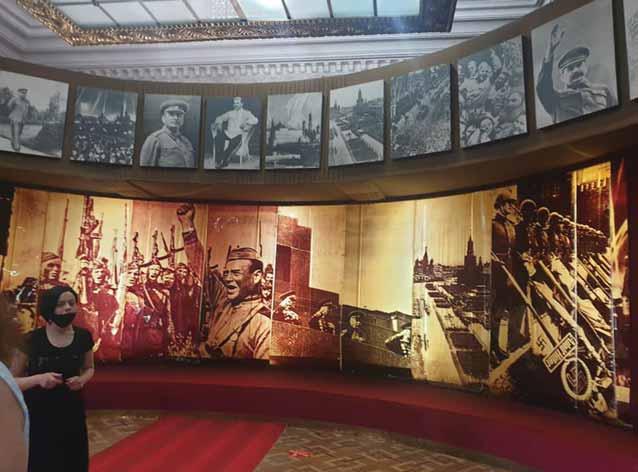
Source: FB
This time at the museum, I learned that "Comrade Stalin was a deeply religious man" who not only prayed and attended church himself, but also personally rehabilitated the Church during the war, which had suffered greatly after the October Revolution. I will leave this place without any comment. All of this could have been learned in recent years during church sermons, and via TV programs of state television channels like "TV Imedi". There are so many things happening in the world right now. And only this museum remains unchanged. Interestingly, its last update was in 1979. Preserved in their entirety are numerous, sometimes the most incredible, gifts given to Stalin from both citizens of the country and foreigners.
And to this day, at the entrance to a large hall decked out in red and black, you are seized by the feeling of immeasurable grief that was experienced by millions of Soviet citizens when they heard the news of Stalin's death. In this mourning hall, the leader's death mask is exhibited, as well as a large canvas with a painting of Stalin in his coffin, painted by a Georgian artist. I took my youngest son, Theodor Kueppers on this latest excursion. It was his second visit to the museum. He doesn't remember his first time: then he was a three-month-old baby. And now he is almost fourteen.
In order to draw a line under my son's perception of this historical figure, I asked the guide to answer the question: "Was Stalin a positive or a negative political figure in general?"
This topic was clearly not to the guide's liking, and she answered evasively: "I cannot tell you this for sure. Officially, probably, Stalin is a negative personality, if we take into account the policy of our state. But for different people Stalin may appear differently. I never talk to anyone about Stalin, I don't even know what my friends, acquaintances, or neighbors think about him. We haven't had conversations on this topic."
Back home, I talked to my son, trying to gauge what he remembered from our museum tour. My son admitted that it seemed to him as if he had visited not only Stalin's museum, but also the museum of Hitler. Have you ever heard of such a thing - a Hitler museum in Germany?! Such a museum is simply unthinkable, either in Germany or in Hitler's homeland in Austria! But who knows what would have happened if Hitler had won that terrible war.
Another thing that impressed my son was the story about how Stalin refused to release his son Yakov from German captivity. The Germans offered to exchange Yakov for their Field Marshal Paulus. "I won't exchange a soldier for a field marshal!" Stalin replied decisively. "That's what kind of monster he was, truly made of steel: Sending his son to death without any hesitation at all!" my son remarked.
Who knows, maybe it's this very persistence, these superhuman qualities, that still make some of Stalin's fellow countrymen tremble in awe? A little boy from Gori, who the whole world feared, who opposed the West for many years, who planted many of his agents there, and who successfully dealt with his enemies abroad.
Thus, Comrade Koba finds himself again on a high pedestal – at least in modern Georgian (not to mention Russian) politics, as well as in the Orthodox Church. "He received a country with a plow and left it with factories. He won the Great War, was an honest believer, a fair and modest person who wore the same uniform all his life!" these are the slogans of modern Orthodox conservative neo-Stalinists.
This is the story of the Soviet werewolf, who refuses to remain in the past, striving for the future with all his might.
The Tbilisi Piano Festival 2024 commenced with an enthralling performance by the acclaimed pianist MarcAndré Hamelin at the Tbilisi State Conservatoire. The evening's repertoire, carefully curated, showcased a fascinating journey through diverse eras and styles, from the early 19th century to the early 20th century, highlighting Hamelin's virtuosity and interpretive depth.
Marc-André Hamelin is celebrated for his extraordinary technical prowess and profound interpretive insight. A Canadian pianist of remarkable versatility, Hamelin has built a reputation for his ability to navigate both the standard and the obscure repertoire with equal mastery. Known for his impeccable technique and intellectual approach to the piano, Hamelin often explores lesser-known works alongside mainstream masterpieces, bringing a fresh perspective to concert programs. Hamelin's style is characterized by clarity, precision, and a deep understanding of the musical structure. His performances are marked by a keen attention to detail and an ability to balance technical demands with expressive depth. He possesses a
unique ability to reveal the inner workings of complex compositions, allowing audiences to appreciate the subtleties of each piece. This blend of virtuosity and musicality was evident throughout the concert, where his interpretations were both technically flawless and emotionally compelling.
The program began with two pieces by Maria Szymanowska, a trailblazing female composer and pianist of the early Romantic period. This was followed by Franz Schubert's introspective ‘4 Impromptus D899,’ a cornerstone of Romantic piano literature. After the intermission, the concert resumed with Robert Schumann's ‘Waldszenen, Op. 82,’ a suite of nine character pieces evoking forest scenes. The evening concluded with Maurice Ravel's ‘Gaspard de la nuit,’ a suite of three pieces inspired by Aloysius Bertrand's poems, renowned for their technical demands and evocative imagery.
MARIA SZYMANOWSKA: POLONAISE IN F MINOR, ÉTUDE IN C MAJOR
Hamelin's choice to open with Szymanowska's ‘Polonaise in F minor’ and ‘Étude in C major’ was both bold and illuminating. Szymanowska, a precursor to Chopin, offers a blend of Classical clarity and Romantic expressiveness. The ‘Polonaise in F minor’ displayed Hamelin's ability
to infuse a dance form with a profound emotional narrative, while the ‘Étude in C major’ showcased his technical finesse and lyrical touch. These pieces, rarely performed in contemporary concert halls, set a tone of discovery and appreciation for overlooked gems in piano literature.
FRANZ SCHUBERT: 4
IMPROMPTUS D899
Schubert's ‘4 Impromptus D899’ allowed Hamelin to explore a deeper emotional and structural complexity. Each impromptu, a world unto itself, was rendered with exceptional nuance. In the first Impromptu in C minor, Hamelin navigated the turbulent contrasts with a masterful balance of drama and lyricism. The E-flat major Impromptu's lyrical melodies and flowing arpeggios highlighted his delicate touch and phrasing. The third, in G-flat major, often considered the heart of the set, was played with a dreamlike quality; its songful lines singing clearly under his fingers. Finally, the Impromptu in A-flat major concluded the set with a vigorous and exuberant performance, emphasizing Schubert's harmonic innovations and rhythmic drive.
ROBERT SCHUMANN:
WALDSZENEN, OP. 82
Schumann's ‘Waldszenen, Op. 82’ offers a series of vivid miniatures, each por-

traying a different aspect of a forest. Hamelin's interpretation brought each scene to life with distinct character and mood. ‘Eintritt’ (Entry) was played with a sense of wonder and anticipation, capturing the listener's imagination from the outset. ‘Jäger auf der Lauer’ (Hunters on the Lookout) contrasted with its alert and lively rhythms, while ‘Einsame Blumen’ (Lonely Flowers) was tender and introspective. In ‘Verrufene Stelle" (Haunted Place), Hamelin conjured an eerie and suspenseful atmosphere, using dynamic contrasts and tonal color. ‘Freundliche Landschaft’ (Friendly Landscape) and ‘Herberge’ (Wayside Inn) offered moments of calm and lyrical beauty. The enigmatic ‘Vogel als Prophet’ (Bird as Prophet) was a highlight with its mysterious, almost supernatural quality. The suite concluded with ‘Jagdlied’ (Hunting Song) and ‘Abschied’ (Farewell), both of which were executed with spirited energy and poignant finality, respectively.
MAURICE RAVEL: GASPARD DE LA NUIT
The pinnacle of the evening was Ravel's ‘Gaspard de la nuit,’ a work notorious for its technical challenges and vivid imagery. ‘Ondine’ opened the suite with shimmering textures and fluid, watery sounds, capturing the essence of the water nymph's
seductive song. Hamelin's control over the intricate, rippling passages was mesmerizing. ‘Le Gibet’ provided a stark contrast with its tolling bell motif and haunting, desolate atmosphere. Here, Hamelin's ability to sustain tension and convey the piece's macabre mood was particularly striking. The final piece, ‘Scarbo,’ is a tour de force of pianistic virtuosity and narrative drama. Hamelin's rendition was electrifying, with rapid leaps and frenetic energy that brought the sinister goblin to life in a dazzling display of technical prowess and interpretive intensity.
The Tbilisi Piano Festival celebrates the rich tradition of piano music and provides a platform for both established and emerging artists to perform in a city known for its vibrant cultural heritage. The festival aims to foster musical exchange and appreciation, featuring a diverse range of performances, and masterclasses. The 2024 edition of the festival opened with Hamelin's recital, setting a high standard for the events to follow. The festival not only highlights the artistry of individual performers, but also promotes a broader understanding and appreciation of the piano's vast repertoire, encompassing works from various periods and styles.
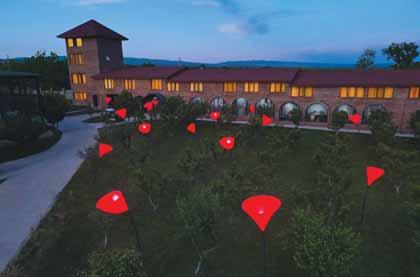
Ria Keburia Foundation is very active in supporting independent artists and artoriented institutions.
WHAT IS THE MISSION AND VISION OF THE FOUNDATION AND WHAT ARE THE MAIN PROGRAMS YOU ARE IMPLEMENTING?
The Ria Keburia Foundation has been operating since 2018. The mission of the foundation is to inspire and enrich the community through the promotion, support and celebration of Georgian art scene. The foundation aims to foster creativity, cultivate cultural appreciation, and provide a platform for artists to thrive and engage with diverse audiences. Our fund operates in the two main directions: First, it is an artistic residence, which is located
in Kachreti, and the second direction is online Platform RIABID, where there are twenty Georgian contemporary artists United. The Ria Keburia A-i-R focuses on critical issues in contemporary art and everyday life.
COULD YOU ELABORATE ON SOME OF THE THEMES AND ISSUES THAT HAVE BEEN EXPLORED THROUGH THE RESIDENCY PROGRAM?
In Kachreti, the foundation has a working studio, exhibition space and all condition for artists to feel comfortable and relaxed in the environment. The fund serves as a bridge for both Georgian and international artists. Often, international artists visit, create their works, and then have the opportunity to exhibit these creations in the Foundation's gallery
PUBLISHER & GM George Sharashidze
COMMERCIAL
DEPARTMENT
Commercial Director: Iva Merabishvili
Marketing Manager: Natalia Chikvaidze
EDITORIAL DEPARTMENT:
Editor-In-Chief: Katie Ruth Davies
space. We also frequently announce open competitions, providing Georgian artists with the opportunity to travel to various European countries with funding and participate in artist residencies. We have already conducted exchange programs in several European countries, including France, Austria, Lithuania, and Italy. Currently, we have announced a competition for a residency in Portugal. Through this initiative, we promote intercultural dialogue and cooperation with European institutions.
CURRENTLY YOU HAVE ON VIEW SALOME DEVADZE’S SOLO SHOW “HEADS, HEADS, HEADS”. CAN YOU SHARE WITH US THE COLLABORATION PROCESS BETWEEN SALOME DEVADZE AND RIA KEBURIA RESIDENCY?
Salome Devadze received her education
at one of America's leading institutions, the Pratt Institute. She recently returned to Georgia, and as a young, aspiring artist, we found it intriguing to collaborate with her. We believe that young artists need more support at the beginning of their careers compared to those who are already established. Therefore, we offered Salome the opportunity to work for two weeks at the foundation's residence.
During her time at the foundation's residence, she created 15 works, which were then exhibited in our gallery space. As visitors can observe through the show, Salome explores identity and femininity in her head series.
WHAT WAS YOUR VISION AND MAIN AIM WHILE CURATING SALOME DEVADZE'S EXHIBITION?
As the curator of the exhibition, I found it fascinating to work with her. She works
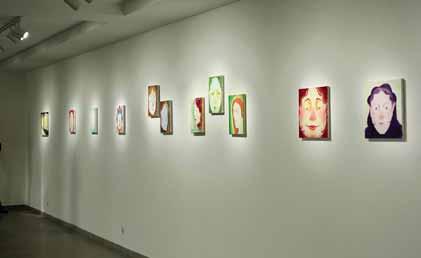
Journalists: Ana Dumbadze, Vazha Tavberidze, Tony Hanmer, Nugzar B. Ruhadze, Mariam Mtivlishvili, Erekle Poladishvili, Shelbi R. Ankiewicz
Photographer: Aleksei Serov
Website Editor: Katie Ruth Davies
Layout: Misha Mchedlishvili
Webmaster: Sergey Gevenov
Circulation Managers: David Kerdikashvili, David Djandjgava
ADDRESS 1 Melikishvili Str. Tbilisi, 0179, Georgia
in a traditional medium, focusing exclusively on painting heads and faces. These faces are more than just self-portraits of the artist; they are generalized representations. Her series of head paintings began to take shape while she was still at the Pratt Institute. Through this series, she delves into the human subconscious, exploring the origin of essence within the heads she paints. Conveying this concept in artistic form is not an easy task. I believe the exhibition turned out to be quite interesting, although initially it posed a challenging task to showcase such a large number of portraits in a single space. However, in the end, the exhibition was well organized and effectively conveyed the artist's intentions. Visitors can enjoy the exhibition until July 18th.
HOW DOES THE FOUNDATION PLAN TO CONTINUE SUPPORTING ARTISTS LIKE SALOME AFTER THEIR RESIDENCY CONCLUDES?
After each project, we aim to ensure that our collaboration with the artist is not limited to a one-time occurrence. Instead, we strive to cultivate ongoing relationships and look forward to engaging in further interesting projects with Salome in the future. A highly effective method we utilize for maintaining these ongoing relationships is through closed auctions, which we host four times a year. Indeed, closed auctions provide an excellent opportunity for our artists to sell their works and establish new contacts. In this regard, I believe our relationship with Salome will continue to be engaging and fruitful.
Tel.: +995 32 229 59 19 E: info@georgiatoday.ge F: GeorgiaToday
ADVERTISING & SUBSCRIPTION
+995 555 00 14 46
E-mail: marketing@georgiatoday.ge
Reproducing material, photos and advertisements without prior editorial permission is strictly forbidden. The author is responsible for all material. Rights of authors are preserved. The newspaper is registered in Mtatsminda district court.
Reg. # 06/4-309
